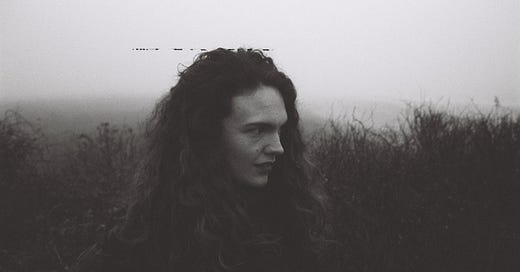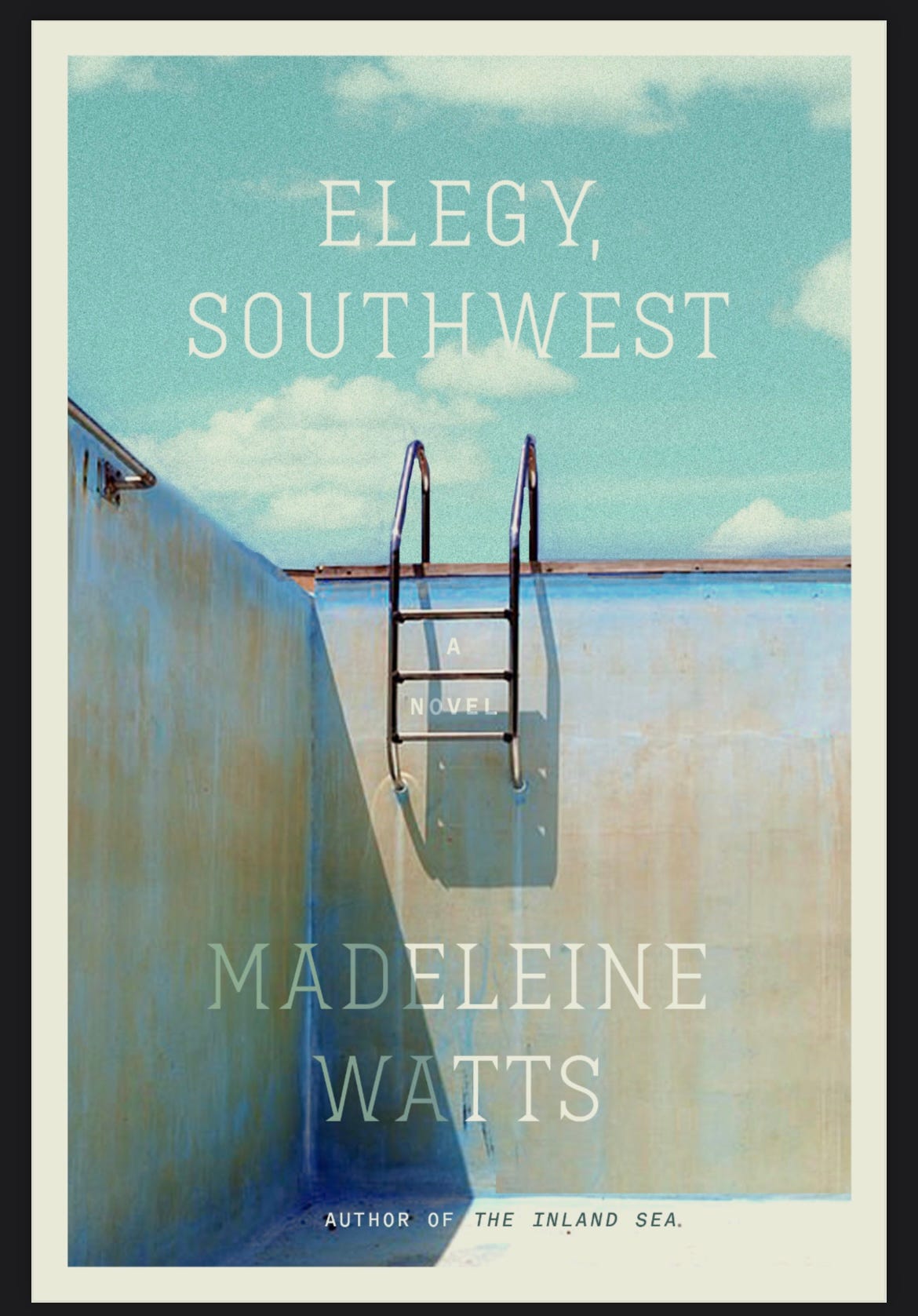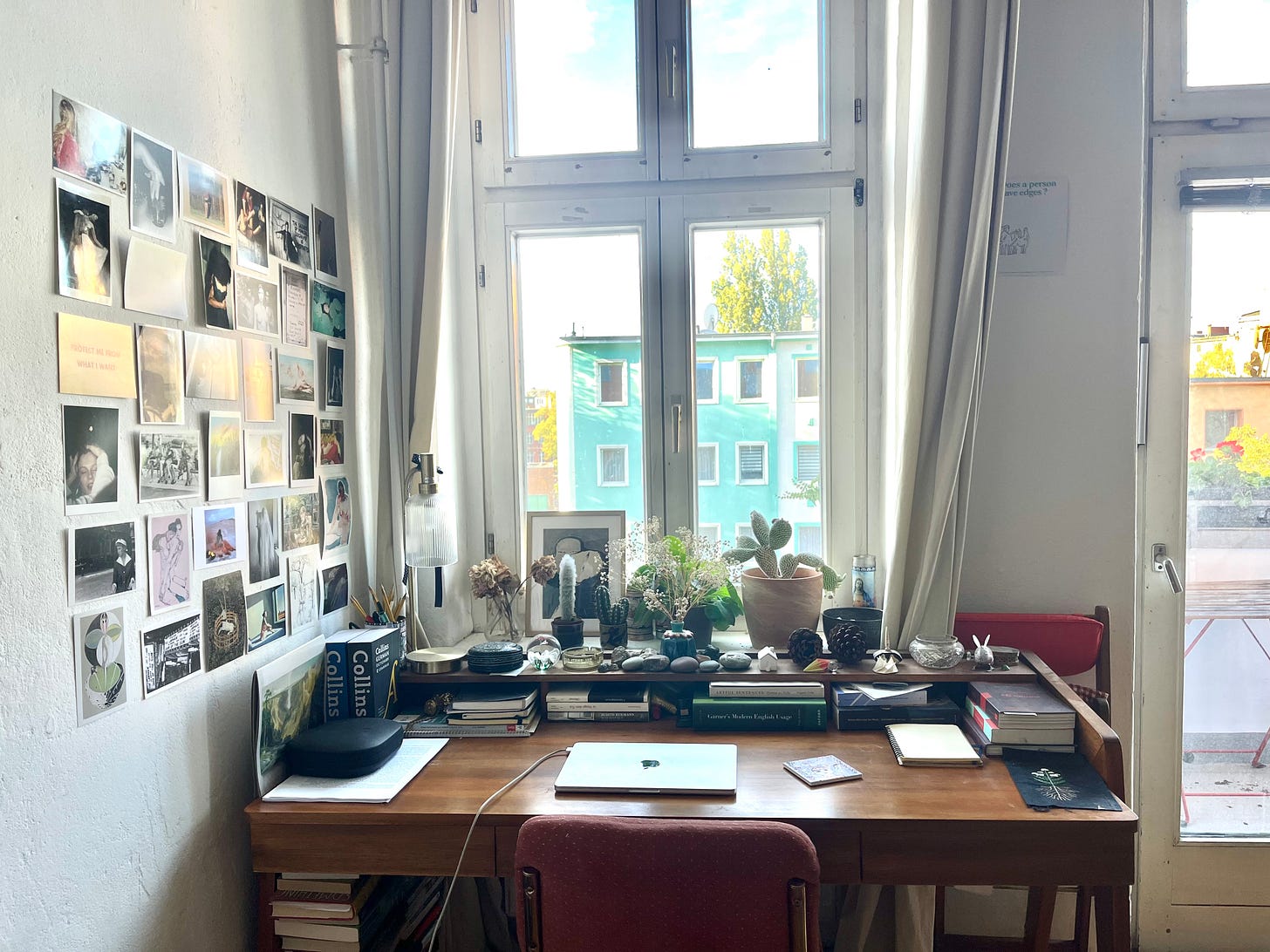Conversation with Madeleine Watts
#Scurf201: The writer on her most recent novel, learning German and life in Berlin
For the latest Conversation, I emailed with Madeleine Watts. Watts is a writer of fiction, stories, and essays. Her second novel, Elegy, Southwest, is forthcoming in February 2025 from Simon & Schuster (North America), Pushkin (UK), and Ultimo Press (ANZ). Her first novel, The Inland Sea, was shortlisted for the 2021 Miles Franklin Literary Award and the UTS Glenda Adams Award for New Writing. Her writing has been published in Harper’s Magazine, The Believer, The White Review, Literary Hub, and The Paris Review Daily, among others. She has an MFA in Writing from Columbia University. Between 2014 and 2020 she was a bookseller at McNally Jackson in New York City. Born in Australia, and after over a decade in New York, she has recently moved to Berlin.
Recent ✍🏼: The Girl in the Picture (Harper’s Magazine) On precocious puberty and its reflections
The politics of these last two years have been relentless, with Germany being more or less at the centre. How’s it living in Berlin in 2024?
It’s funny, this question made me really think about how disconnected I am from German news. I only moved to Berlin from New York in February, so I still feel very much in flux and not quite like I’ve found my footing here. Most of the way I’ve experienced the politics of the last two years has been squarely American, in New York. And in many ways it still is, because I read and consume American, British, and Australian news. My German is still pretty clunky, and while I’m working on improving it, it does mean that I live in an Anglophone parallel world, here in Berlin. When I arrived earlier this year there were a lot of conversations I had with people who had been at the forefront of pro-Palestinian activism at the end of 2023 who were feeling particularly disillusioned and unwelcome in Germany (some have since left the country), and most people I know are concerned about the rise of the far right. I think what I notice the most is that the things people are worried about are common to every country I have a foothold in (the US, Australia, Britain, and Germany): in all of them there’s a housing crisis, in all of them there’s an alarming rise in far right sympathy, in all of them there’s a rising fear of migrants, in all of them there’s suppression and condemnation of anybody critical of Israel’s actions in Gaza. The trends are global, and that’s maybe what I find most alarming.
You routinely post your monthly reads on twitter. Does that help as an exercise?
I’ve been grappling with just that question recently, because I’m not sure whether it does help! I started posting what I was reading to Twitter and Instagram in about 2018 when I was still a bookseller at McNally Jackson, sort of an extension of what I was doing at work every day. In the pandemic it became habitual, as though I could still book-sell from home, in a way. In the last couple of years, though, I’ve done it less frequently, as my job description on my tax return has gone from ‘Bookseller’ to ‘Writer’. Reading is part of my work, and performing it in public sometimes feels quite uncomfortable, and I worry occasionally that I’ve felt it changed the way I read (which is also the way that I write). I also don’t like the way social media has a tendency to turn reading into a kind of gesture, often more about the cover of a book placed nicely beside a mug of coffee than an engagement with the actual substance of a book, its ideas, its aesthetic value, its artistry. I worry about contributing to that, which is why I’ve gone through long phases of cutting it out and going quiet. But then somebody will contact me to tell me they miss it. And I know that even though it’s a tiny gesture, it’s a gesture that can be a kind of advocacy, one that’s generated really interesting and productive conversations (and has been how I’ve made many friends, and part of how I met my husband in fact). So I’ll keep doing it for now, with many equivocations!
What has the experience of working on your second novel been like?
Hard in many ways, but also really satisfying. It was an extremely difficult book to write. But I’m proud of how it’s turned out. It was a bit of an experiment at the start. I knew for a long time that I wanted to write about the American southwest and how I felt about it, but I hadn't known what to do with all of the notes and ideas I'd been accumulating for years. It was only in 2021 and 2022 that it started to come together with a sense of story and form - the road trip following the Colorado River’s course, a disappearance, the idea of the long-held secret only now being told. All these questions I had in my mind about grief, water, climate change, and memory - I finally found a container for them. And I think I’ve managed to do several technical things, structural things, I couldn’t do in my first book. There are experiments with form and voice and the limits of the novel that I feel like I’ve just about pulled off, which is satisfying. I was also trying to write into really difficult emotions, and it’s been gratifying to hear some of the early feedback and know that I’ve managed to evoke strong emotions for readers. Several people have reported crying, which I find perversely satisfying.
How would you define your writing practice?
My writing practice is basically indistinguishable from my life generally. My husband sometimes has to remind me to take days off and, like, go to the lake, or the movies. Most things I do are built around writing, either the actual doing of it, or finding both the time and money to ensure that I can write. I once tried to talk to my sister (who is a pastry chef) about how strange it is to walk around the world in some ways always writing, even if I’m sitting with her in a café or we’re cooking dinner together. I gather it’s not the way she moves through the world! A part of my brain is always doing the background work of writing. I don’t know that I can ever make it stop, and I don’t think I’d want to. Right now I’m in an in-between state where I’m flitting between three or four documents all of which have the potential to be books, but none of which I’ve quite settled into yet. I’ll probably go on like that until my novel comes out in February, when I’ll finally commit to one of them!
How do you account for the interruptions of your social calendar while writing a book?
It’s just part of things. As a shy child I always tended to have a smaller group of close friends anyway. This summer my social calendar has been pretty unaffected, and I’ve gotten very little written. That’s about to change. It’s sad, because there’s a certain amount of retreat from the world that has to happen. Only certain people in your life understand when you say you can’t hang out tomorrow night because you’re writing, and those are the people in my life I cherish the most. One real downside I’ve noticed lately is that any friendship I’ve had that relied on email has tended to suffer if not dissolve completely – I think it’s because email is a text-based medium, and too close to what my mind tells me is ‘work.’ Phone calls are great, I love phone calls.
Is it different now, when you go into a new project, versus the first book or your essays? What’s the feeling of entering that space? How is it different with a substantial body of work behind you?
It does feel slightly different now. A decade or so ago, I felt what I now understand was a kind of freedom. I could write anything, and it was so unlikely anybody would pay attention, or care, or remember what I’d written. Now I have an inner critic, I suppose, who I carry around with me. And not quite as much freedom to play around as I used to. But I’ve also noticed lately a new kind of fun, which is the fun of creating bridges and connections between one piece of work in another. I’ve been playing around with a piece I wrote for Harper’s two years ago about young girls and images and precocious puberty, and thinking about building it into a piece of fiction. The potential to build that kind of doubleness out of already published work feels really productive.
Does the adrenaline of a deadline work for you?
Sort of. I’ve always found it extremely stressful working on anything right up to a deadline, so I tend to try and finish things well ahead of a deadline to save myself the adrenaline spike. So I guess no, because I do everything I can to avoid the adrenaline spike!
Who are the literary critics you read closely? What do you like about them?
I’m friends with several literary critics, and love reading their work – Alexander Wells, Ryan Ruby, Lauren Oyler. I like the work of Andrea Long Chu, Christian Lorentzen, A.S. Hamrah, and Christine Smallwood, all of whom illuminate the world through their criticism, which I guess is what I want from criticism. I don’t always feel like I’m an especially good critic – it often takes me a while to articulate what I think about something, and because I’m a writer above anything else I feel a bit contaminated as a critic, like I’m always coming to the task with really filthy hands.
Does speaking with friends about your writing help you in some way? What is the worth of literary community in your writing life?
I have a lot of writers in my life, and one of them, luckily enough, is my husband, Vijay Khurana. I talk things through with him more than I do anybody else, and often it’s those conversations which have helped me solve problems in my work or puzzle through an idea. We are both in a long-standing writing group with other writers spread between New York and Berlin, and that group of people are absolutely invaluable. We meet once a week (usually!). We’ve been reading one another’s work for so long, in such depth, and I trust them implicitly, as well as learning so much from reading and talking about their work. But I’d also say that the vast majority of my friends and acquaintances are writers (or else people who work in publishing or media), and we’re not always talking about our own writing, or even really building ‘community’. We talk about the writing of others, we gossip, we drink and smoke ill-advised cigarettes.
Could you share the background to your move to Berlin?
When I met my husband I lived in New York and he lived in Berlin. We spent three years going back and forth about which of the two cities to live in, but we eventually settled on Berlin. There were lots of reasons for that, but principally Berlin won out because there are things we want from our lives as writers, and we can have those things in Berlin, but they're a lot harder to come by now in New York.
What do you find fascinating about the current literary world?
I don’t know if ‘fascinating’ is the word, but I have been really energized and excited by moving to Berlin. For various reasons, there are an enormous number of Anglophone writers living here, and I would take a guess that it’s the biggest centre for Anglophone literature in the non-English speaking world. It’s a meeting place for writers who might ordinarily be siloed off in their own national ‘scenes’, but here there’s a constant meeting of Americans, the English, the Irish, Australians, etc., (I will say that there’s not a lot of integration with German-language writers, but I’m working on that!). There’s an energy here I haven’t felt elsewhere. And I think the time I’ve spent in Berlin has absolutely improved the work I’m making.
Recommendation corner
Your go-to podcast: I listen to a lot of podcasts, all of which I’d consider go-to’s. I usually listen to the Guardian’s Today in Focus every morning. And I always listen to these whenever there are new episodes: You Must Remember This, Stories From Sydney, Normal Gossip, Lecker, Bad Gays, 99% Invisible, Articles of Interest, the Film Comment podcast, Backlisted, and Bookworm (although that last one has sadly been on hiatus for a while now).
A recent book/author criminally underread: The best novels I’ve read over the last year or so I didn’t think got enough airtime were Anam by André Dao, The Seers by Sulaiman Addonia, When I Sing, Mountains Dance by Irene Sola, The Guest Lecture by Martin Riker, Orbital by Samantha Harvey, The Italy Letters by Vi Khi Nao, The Observable Universe by Heather McCalden, The Love of Singular Men by Victor Heringer, Planes Flying Over a Monster by Daniel Saldana Paris, and Fail Worse by Habib William Kherbek (although this last one is new!)
The album/artist you’re listening to: I am spending all my time lately listening to a 7-hour long country music playlist my friend Laurel sent me entitled ‘Blue Eyes Crying in the Rain.’ A lot of John Prine, Townes van Zandt, and Patsy Cline, blasted very loud as I cycle home through Berlin.
Emojis you use the most: I don’t use emojis that much, but if I do it tends to be either 💙 or 🙃
The TV show you love and no one seems to get why: Deutschland 83/86/89, Babylon Berlin, Kleo – mostly because nobody gets why I now almost exclusively watch German television if I’m watching TV. (The answer: I’ve convinced myself it counts as ‘learning German’).






